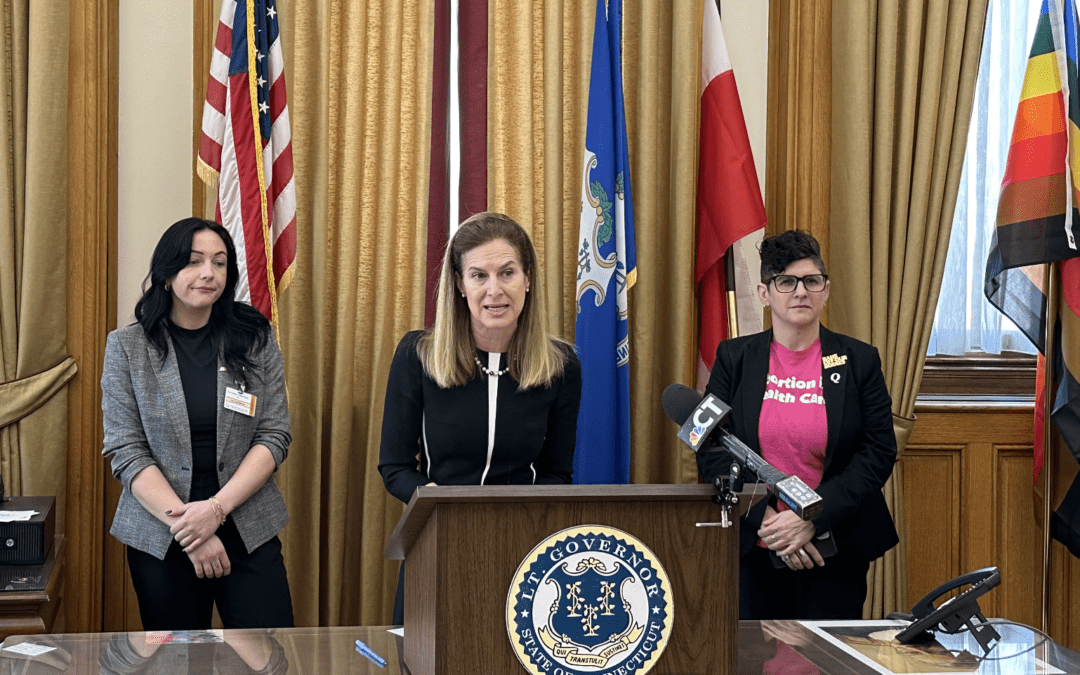Courtesy of Sam Taylor
With access to Mifepristone — a medication that is used in roughly 50 percent of abortions — on the line in a Texas lawsuit, Connecticut Lieutenant Governor Susan Bysiewicz has formed a 22-state coalition as a “firewall” for reproductive rights.
Launched on Monday at the State Capitol, the Reproductive Freedom Coalition consists of lieutenant governors who represent 165 million people in total. The coalition will serve as a space for state leaders to share executive orders, legislative ideas and legal strategy after the reversal of Roe v. Wade through the Dobbs decision. The group is inspired by Connecticut Governor Ned Lamont and other governors launching a similar reproductive coalition in February.
“Each of our states has individually advocated for impactful and innovative legislation to protect and expand access to women’s health care, and this coalition will work together to share best practices, and fight together against those wishing to restrict access to essential care,” Bysiewicz told the News. “We have many female lieutenant governors, and I thought that we should use our platform to amplify that effort and try to further expand and protect women’s reproductive rights.”
According to Bysiewicz, an important component of the coalition will be sharing legislative strategy between states. Most lieutenant governors, she explained, serve as the presidents of their state senates and thus have a crucial legislative role in their respective states.
Bysiewicz told the News that she looks forward to working with leaders in Connecticut and across the country to implement stronger protections in the state after the passage of the Reproductive Freedom Defense Act, which codified and expanded access to abortion in Connecticut.
“Most of these states are Democratic states that pass legislation that we can look at and mirror to strengthen our own reproductive freedoms,” Bysiewicz told the News. “I think there’s a real sense of urgency and I know the other lieutenant governors who join me also share the urgency.”
Connecticut’s legislature is currently debating legislation that would expand access to abortion care by creating vending machines for abortion pills on college campuses, expanding the state’s Medicaid program to fully cover abortions and protecting Connecticut doctors from out-of-state legal action from anti-choice areas.
Connecticut is also debating legislation proposed by State Treasurer Erick Russell and State Reps. Jillian Gilchrest and Matt Blumenthal to create a fund that would pay for transportation and living expenses of any pregnant people living in anti-choice states who travel to Connecticut for an abortion.
“Since the Dobbs decision we’ve seen about a 30 percent increase in patients coming from states that have banned abortion,” Gretchen Raffa, vice president of public policy, advocacy and organizing at Planned Parenthood of Southern New England, told the News. “We think that that number is going to continue to go up because the reality is, as our neighboring states become kind of the go to for people that are traveling from the states that have banned abortion.”
Bysiewicz told the News that she has also been working with the lieutenant governor of Delaware, Bethany Hall-Long, on the state’s recent push to codify the right to abortion in the state’s constitution. While the state’s legislative Reproductive Caucus is currently not planning on pushing for a similar amendment in Connecticut, Bysiewicz believes that it is an important area to study in the future.
The creation of the coalition also comes as the Fifth Circuit Court of Appeals in Texas hears a case from anti-choice groups who hope to restrict access to Mifepristone. Bysiewicz told the News that the lieutenant governors have been working to create safeguards in their respective states in case the Fifth District revokes FDA approval for the drug.
In Connecticut, Lamont, Bysiewicz and Attorney General William Tong are working to create legal backstops to protect access to the drug as well as ensure continued access to other safe methods of abortion.
The reproductive coalition will meet regularly over Zoom and has already held briefings with the national Planned Parenthood about the Mifepristone lawsuit. According to Bysiewicz, the lieutenant governors have begun trading policy briefs between their staffs about legislative and executive policy that can be enacted on the state level.
The group also plans on working with federal legislative and executive leaders to help increase healthcare funding to states and protect access to reproductive medication like Mifepristone if the Texas lawsuit results in the revocation of FDA approval for the drug.
“It is paramount that state leaders work together to ensure that women have the freedom to make their own healthcare decisions,” Delaware Lieutenant Governor Bethany Hall-Long wrote to the News. “The Supreme Court’s decision to overturn Roe v. Wade was an offense to all women. We must lead by example in every State to ensure reproductive rights for women.”
Three Yale Law School alumni voted to overturn access to abortion on the federal level in June.
Yash Roy covers City Hall and State Politics for the News. He is also a Production & Design editor, and Diversity, Equity & Inclusion chair for the News. Originally from Princeton, New Jersey, he is a sophomore in Timothy Dwight College majoring in Global Affairs

